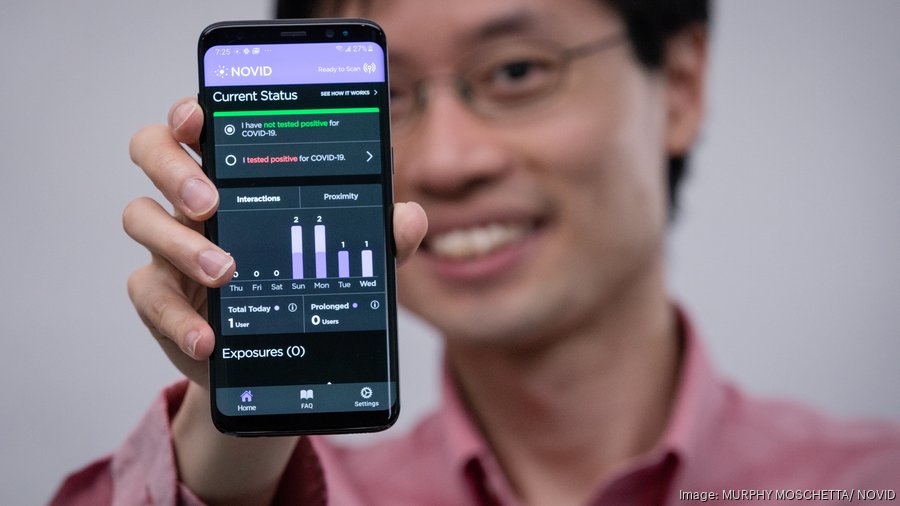Carnegie Mellon University mathematics professor Po-Shen Loh created a technology that can warn users of elevated Covid-19 exposure risk before they get the virus, and he has high hopes that it’s the strategy the U.S. needs right now.
The app, called NOVID, uses ultrasonic and Bluetooth technologies to measure the distance between devices that a user comes into close contact with. It uses an animated graph—“sort of like weather radar, but for Covid”— to represent the number of Covid-19 cases a certain distance from you.
That distance is not just measured by physical distance, like a zip code area, but rather by the people you’ve interacted with and the people they have interacted with and the chain reaction that occurs. Loh said that’s important because Covid-19 is most often spread among people within a household or spending time with one another, rather than someone you pass for a few seconds in the grocery store.
“We’ve basically taken contact tracing and flipped it around,” Loh said. “To instead tell everyone how far away a positive case is. This is a different angle and a very powerful one.”
Loh said the information in the app encourages preventative measures, such as wearing masks and PPE or practicing greater social distancing or isolation, rather than just reactive measures once the coronavirus is confirmed. He said the insights provided through NOVID can help with reopening efforts.
“You don’t need to lock down the whole city for that. Once you have this system it can almost automatically facilitate very targeted lockdown type things in very small pockets of an entire population,” Loh said.
Loh targeted universities as a starting point for adoption of NOVID. Georgia Tech became the first university to select NOVID as part of its return to school strategy for the fall semester, and Loh said he expects to make more university partnership announcements soon.
Already, at Georgia Tech, Loh has seen adoption of the App spread outward from the university, to parents of students and many people who interact with the campus community members.
“What we know will happen is that the app itself will spread across the city,” Loh said. “You just need that critical mass of one university to go in.”
Loh is also founder of Expii, a social enterprise that offers both paid and free STEM education resources. He funding NOVID with revenue from Expii’s paid high-level online math classes for middle and high school students. Loh said he’s not fundraising or taking investments for NOVID, but only accepting philanthropic donations. The app also does not collect personal data and operates completely anonymously.
Loh said he’s hopeful a vaccine can eventually help stop the spread of Covid-19, but he created NOVID as an immediate solution to mitigate the crisis.
“We started this because we wanted to save the USA and the world. Unfortunately, the situation in the USA is very bad right now,” Loh said. “This was started because we have to do something now. These months are very important as people are starting to become interconnected again.”
